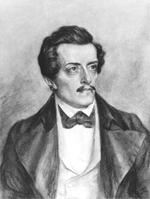The Three Bards (Polish: trzej wieszcze, IPA: [ˈtʂɛj ˈvjɛʂt͡ʂɛ]) are the national poets of Polish Romantic literature. The term is almost exclusively used to denote Adam Mickiewicz (1798–1855), Juliusz Słowacki (1809–1849) and Zygmunt Krasiński (1812–1859). Of the three, Mickiewicz is considered the most influential and Krasiński the least.
The Three Bards were thought not only to voice Polish national sentiments but to foresee their nation's future. They lived and worked in exile following the partitions of Poland, which had ended the existence of the independent Polish state. Their tragic poetical plays and epic poetry, written in the aftermath of the 1830 Uprising against Russian rule, revolved around the Polish struggle for independence from the three occupying foreign empires.
The concept of the "Three Bards" emerged in the second half of the 19th century and remains influential among scholars of Polish literature. At the same time, it has been criticized by some as anachronistic. As Krasiński's influence waned, some have suggested replacing him in the trinity with Cyprian Norwid, or adding Norwid or Stanisław Wyspiański as a fourth bard.


